- Home
- Richard Flanagan
The Sound of One Hand Clapping Page 4
The Sound of One Hand Clapping Read online
Page 4
Bojan smiled. That charming, disarming smile, that she had with so much else forgotten. That smile with which he nervously punctuated his sentences—easy and soft and reassuring—that smile was the same she used when unsure of herself, the same smile that made people like her, made her look open when she knew herself to be closed. In him she saw all of herself and was simultaneously comforted and frightened. In her he saw something that struck him as a curious mockery: that there was something good that had issued from his lousy life.
So both averted their gaze so that they would not see in the other those parts of themselves that they preferred to hide.
‘Let’s not lie to each other,’ he said after a time, his words heavy with accent and something more, something else.
Sonja looked up.
‘I look what I am,’ said Sonja’s father. ‘An old wog drunk.’
And he laughed quietly, sadly.
In the Tullah pub the fires blazed and the rain fell with a passion and neither spoke for some time, both lost in their thoughts and in their embarrassment at knowing each other so well and having everything to tell and nothing to say.
Bojan sought to speak once more. ‘I … ah, no. No…’ He halted, gathered his thoughts in his head, and tried to rearrange them into a semblance of correct English. ‘I would have write you, eh, letters, but, eh, my English, good for work, good for pub, not so good on paper.’
He shrugged his shoulders and held his hands outwards in embarrassment. Sonja gave a small smile, at his unease, at his beautiful movements, so familiar, so forgotten, so unlike anybody else she had ever known, and forgave him with a wave of her hand.
‘There are things that matter more than words,’ she said. Then paused. Her comment had however struck Bojan. He became almost garrulous, though not angry in his refutation of it.
‘Perhaps you say this because you have plenty of words,’ he said. ‘You find a language. But I lose mine. And I never had enough words to tell people what I think, what I feel. Never enough words for a good job.’
He stopped. Abruptly. Sonja looked at him, felt something so huge rise up within her that she wondered how she had for so long not known it was there. Without meaning it, for she had never intended to touch him so, she reached out and with the back of her hand softly stroked his leathery cheek.
As they both became conscious of her offering of grace Bojan recoiled as if shot. His hand flew upwards and it slapped Sonja’s hand away, so forcibly she bit her lip to stop from yelling out in pain.
Then his hand too fell, as abruptly as it had risen, and he stared hard at her. Bojan Buloh spoke quietly, as if to himself, so quietly that she had to lean forward to hear him say what was almost an apology for his life.
Hear in him a broken voice.
Whispering: ‘Never enough words for you.’
Chapter 9
1954
ONCE IT HAD NOT been this way, thought Bojan Buloh. Once he had been able to find within even his broken self the thing, the mystery that he shared with all other men and women. But the thing that made him one with himself and with others, that thing was gone, the mystery had flown into the forest with the furious blizzard winds of the evening before, and all he had left was one terrifying certainty, that he was no longer a man, but fragments exploding ever outwards.
On that day after the night Maria Buloh walked out into a blizzard, Bojan Buloh stood silently with all the other prospective new Australians and their families and their friends in the large vertical-board hut that was the Butlers Gorge movie hall, waiting for a local politician to conclude his address from the dusty stage.
‘You men and women have decided to join your fate with that of Australia’s by today being naturalised,’ the politician told them, his words as burnished from use as his greasy suit collar. ‘In so doing you are making a better world for yourself and your children. This fifth day of May, 1954, is a momentous one for you. You and your children are part of a new vision of a new Australia.’
Behind the politician sat two officials at a table, and behind them the Australian red ensign and the union jack were crossed. In the forlorn hope of making the place appear festive, some tatty bunting was draped from the rafters and some portraits of the young girl-Queen and Ming Menzies hung off nails driven into the unlined studwork. For the Australian officials the naturalisation ceremony was a joyous, celebratory moment when the new Australians renounced their previous citizenship—their country, their past—to become Australians. For those being naturalised it was a sad but necessary step to take.
The politician looked up from the lectern at the crowd, chin uplifted in what he believed to be the correct pose of a visionary. The next part of the speech the politician delivered without the aid of his notes, because it came from his heart. ‘The path to the new Australia is lit not only by the electricity that will come forth from your labours here at Butlers Gorge, but by your conviction that the new world can be better than the old.’
The room swirled in front of Bojan Buloh’s eyes. The young girl-Queen and Ming Menzies circled around him like wolves, and all the crowd and all of that hall, all of it and all of them revolved around Bojan like some carnival merry-go-round. He felt dizzy, felt the floor beneath him rise and buck and roll at strange angles like the hall was at sea, like he was caught in some wild storm in the Adriatic and he was unable to do anything more than keep his balance and fight the terrible fear akin to vertigo that was shaking not only his body but his soul. He felt his head grow unbearably heavy, felt it grow huge with some unnameable pain, felt it loll grotesquely and felt some force of will that seemed alien yet was strangely, undeniably part of him force it back into a position that he hoped appeared normal. But he could not stop his bottom lip quivering, was unable to stop his head slightly shivering.
He felt the three-year-old hand of his daughter Sonja grasped around one of his fingers, felt it grip that finger with all its puny might, and it seemed as if his arm were in another country that he was leaving forever and to which he might never be allowed to return. So that his head would not drop off his shoulders and roll onto the floor, an orb out of whose empty eye sockets flames would dance, he very stiffly turned his head, to ensure it remained connected to his shoulders, to make sure that she, Sonja, was still there, standing next to him, a three-year-old girl pretty in a formal party frock, her hair done up in ribbons.
Bojan knew he had an arm because he could feel Sonja holding his finger. That must mean that it is connected to a hand and the hand to an arm, that must mean, thought Bojan Buloh. And he knew he must still have eyes even if he doubted that also, because he could see Sonja. That must mean eyes that I must have and they must be connected to my mind, that must mean, thought Bojan Buloh. But when he could no longer see Sonja, when he could no longer feel her presence, what would that mean? He had no answer to this, only a most terrible consuming fear that he could not deny.
‘You bring your hope and determination,’ continued the politician, ‘and in return receive the great gift of English civilisation, the English language and our belief in justice and fair play.’
A Polish worker standing near Bojan spoke, though not to Bojan in particular but as an aside for all who stood near to hear. ‘I’d rather the good meat and vegetables and fresh fruit that the Pommy engineers and their families get,’ he said. There was a ripple of muted laughter.
There is only this, thought Bojan. Flesh and stretched bones and shit and wood that grows in trees that stretches flesh and flesh that flattens wood to make meaningless things such as this hut in which we are and this noise that means nothing. There was birth and there was love and there was death, and there were only these three stories in life and no others, but there was also this noise, this endless noise that confused people, making them forget that there was only birth and love and that each and everything died. There is only that, thought Bojan, and he lifted Sonja to his chest. He began to sob, at first quietly, then uncontrollably, and it was then that Sonja put her
small arms around her father’s head, and cradled it as if it were the most fragile thing in the world, as if it were made of china and could as easily be broken.
The politician, after a sideways glance at Bojan, assumed that the weeping migrant was overcome with happiness on the occasion of this great day. To battle the embarrassment the politician shared with the officials at this untoward—though, he knew, for their race characteristic—display of emotion, the politician felt encouraged to extend his speech with some lengthy observations about the present world situation, formed on a fact-finding tour of the Empire he had recently made in the company of several other leading statesmen. Some friends of Bojan’s came up to him. He felt their arms wrap around what he presumed was his body and he felt that body push them away, heard his mouth form and twist and say in a language he knew little of and found harsh ‘Fuck off fuck off,’ and, shivering head erect, he stood alone and unsupported, looking through the politician, as if seeing beyond the enclosing walls into the forest and its terrible mystery, alone in the crowd with Sonja and sobbing.
When later in the afternoon two engineers’ wives took Sonja away and he did not fight it—though she did, but to no avail—it was commented upon how blank was her face. She was still dressed in the same party frock. She appeared neither happy nor sad. For a long time she stood motionless upon the snow-covered ground as if part of a carefully composed painting: the tall eucalypts and wistful sky full of scudding clouds in the background, the harsh vertical-board shacks of the construction village in the mid-distance, their once sap-green swamp-gum timber now grey and twisted. In front of her the women had set up an upturned gelignite box, covered with a makeshift red chequered tablecloth, upon which was arrayed her toy china tea-set for her to play with.
Sonja picked up the teapot, moved it past the tablecloth, and let the teapot fall to the ground where it smashed.
There was no energy in what she did, rather an absence of energy, an absence of emotion, desire. There was no joy in the pot smashing nor anger in the dropping of it. And so she continued in a methodical, entirely impassive manner, smashing the tea-set. Though her face betrayed no such emotion she felt momentarily surprised that the sound of the smashing porcelain could not overwhelm the other sounds she carried within her. First the teapot, then the milk jug, then the saucers and the cups, all fell to the ground and broke into dozens of fragments. But no matter how many tea-set pieces fell to the ground the other noises always returned like a howling inside her head that would not leave: sounds of her father sobbing, of the blizzard wind that had beaten up their shack-home the night before, of her mother singing, of her mother singing. Teapot and milk jug, saucer and cup upon concrete. Porcelain, pearl-smooth on the outside, sharp as glass and dry as death upon breaking. Had they broken? Had they?
Teapot and milk jug smashing. Her mother singing. Her father sobbing. Saucer and cup breaking. A howling inside that would not leave. Her father and her mother.
Saucer and cup.
Singing.
Saucer and cup.
Breaking.
Chapter 10
1989
THE SMASHING AND singing and sobbing and howling eased and then was gone. The noise of the chill wind whinnying in the electric wires overhead, too, thankfully began washing into times long gone. Sonja took some deep breaths. To force it all away properly, hopefully forever, she focused on the sound of the rain that beat upon the motel room’s aluminium window with a strange and insistent rhythm; sweeping, scratching, receding, as if hoping to gain entry, then despairing and leaving.
When finally she felt sure of her time and place, sure that time had not bent back around and taken her once more into a past she wanted nothing of, Sonja opened her eyes slowly. Switched on the bedside lamp. Assured herself that she felt better. Tried to forget her dream of then by immersing herself in that strange and peculiar detail of the motel room now. A low tide of dull light spreading out from a cheap bedside lamp to the built-in wardrobe with its peeling wood-grain laminex skin sticky-taped back into place. Assured herself. The sticky tape now curling. Felt better. The sink set into the wardrobe. The mirror above it with corners browned.
The mattress’s plastic cover crackled as she rolled off the bed and went over to the mirror, to stand before it gazing at her reflection. She raised her singlet and with her right hand described her belly as a circle, slowly rubbing the soft flesh round and round, as if trying to bring forth some new magical shape, a genie from the spirit lamp of her midriff. But there was in that place, on that evening, no magic to be had. Even in the dim yellow light she was able to observe, without either satisfaction or despair, that her stomach was flat.
Next to the bedroom sink lay a damp knotted scarf. Sonja let her singlet fall and picked the scarf up, untied the bow holding it together, and looked at the dirty porcelain pieces she had discovered earlier in the day. Piece by piece she carefully cleaned the dirt that stubbornly clung like long protective grease to the various jags of broken china, rinsing each one under the tap, knocking off the larger dags of dirt, then working each fragment more thoroughly by scrubbing them with her toothbrush. She watched the whiteness and scarlet bramble pattern gradually being brought out of the darkness, as if she were a painter for the first time discovering the mystery of her subject within the canvas. After, she dried the shards and fragments on a motel towel, placed them on her bed and there, in the direct light of the bed lamp, began to try and piece them together.
She worked carefully, patiently trying first one way, then another, until she succeeded in beginning to get some in an arrangement that suggested a small teapot of old design. In the end she managed to assemble perhaps a quarter of the teapot, before in frustration giving up. For the pieces would not fit, would not allow themselves to be made back into some order that might make sense, that might mean something, anything.
But within the mirror a small child clutching a teapot trembled.
Chapter 11
1989
SONJA STOOD UP and went to the open doorway of Bojan’s room to look at the world outside. There it was late afternoon. For Sonja, the town of Tullah did not so much nestle in that high valley with wild mountains around all sides, as appear to be an industrial accident swept up into orderly piles, left sinking into swampy ground. Everybody, everything was temporary. Except the rainforest and the buttongrass that would come back when this brief intrusion was over. It was not a place in which people were born or would wish to die, but a place that they simply longed to leave.
The promise that had been made to the migrant workers, the offer of a better life in Australia than in war-ruined Europe, the elusive rainbow of prosperity and easier, more peaceable times, had grown thin and distant, till it was no longer something real but a half-remembered kaleidoscopic dream that it was better to try and forget. Till it was no more than an occasional aching shriek; sounding shrill and unexpected, that could, with sufficient effort, be crowded out with the low thrum of dull everyday certainties. Everybody brooded sullenly in the sour swamp that was Tullah, waiting for a moment of catharsis that might relieve the monotony: a death building the dam, a brawl at the canteen ending with an urn of boiling water being thrown, some prostitutes over from Melbourne for a hard-working weekend beginning with their being raffled at the pub.
In this manner the reffos grew old in the hydro construction camps before they knew their time had already gone. They gazed around at the young who laughed behind their backs but who were secretly frightened of the hardness of such men and what it prophesied of their own destiny; and the old men watched the new drugs, the dope and the speed and the acid, partly supplant the grog as the necessary corollary of such wretched lives. Nothing had changed except for the fact of variety, and whereas refuge and forgetting could once only be found with fluid, it could now also be found with innumerable tablets, powders, and herbs. The old had eyes like boiled saveloy water and the young had eyes like pin heads. The old drank beer a jug each a time, and the young smoke
d six paper joints and ingested stupendous quantities of amphetamines till their hearts raced as hard as their unhappy souls and they felt only tears of bitterness at such a union of body and spirit.
Sonja looked across from Bojan’s room at the mirror-image of the single men’s quarters in which she stood: another long skinny single-storey barracks clad in corrugated iron, doors running down its length, verandah above, washing hanging out the front upon pieces of nylon cord stretched from post to post, fraying singlets, khaki denim work trousers faded to the beautiful colour of eroded sandstone, coarse woollen jumpers in all colours, and t-shirts inscribed with the messages of a world that had no place for those who stretched into them, shift after shift after week after month after year. Men came and went from this battery-hen cage, and Sonja watched how at the far end of the single men’s quarters opposite, a rolling fist of listless men folded and unfolded, tensed and untensed, as if forever unsure that their physical strength was not some cruel disability, talking in short sentences followed by long awkward laughs.
Behind each door was a miserable cell of a room, identical to the one in which she stood, the one which Bojan forever refused to call home, but in which he had lived for decades now, in various reincarnations at various hydro dam construction camps, each new cell sufficiently the same as the last for him to be confirmed in his belief that no single one could ever be special. It came with a steel bed and nothing else, because anything else the authorities rightly figured would be stolen. There was, in any case, scant space to contain much, but in spite of this some of the inhabitants would attempt to reform the cells as suburban lounge rooms, ludicrous and compressed dreams of stillborn domestic ambition. Others treated their room only as a bivouac, which they would soon be leaving forever as they headed out to meet their destiny somewhere else, anywhere else other than Tullah.

 Death of a River Guide
Death of a River Guide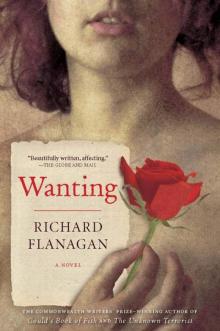 Wanting
Wanting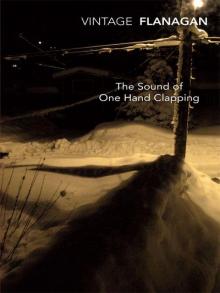 The Sound of One Hand Clapping
The Sound of One Hand Clapping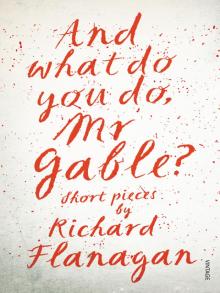 And What Do You Do Mr. Gable?
And What Do You Do Mr. Gable?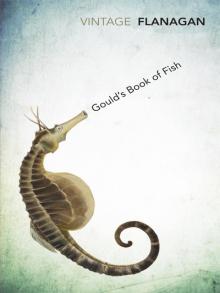 Gould's Book of Fish: A Novel in Twelve Fish
Gould's Book of Fish: A Novel in Twelve Fish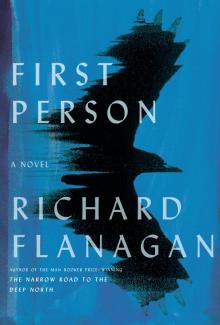 First Person
First Person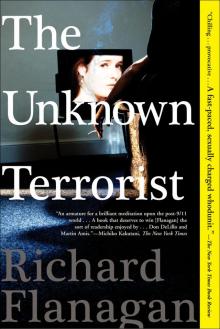 The Unknown Terrorist
The Unknown Terrorist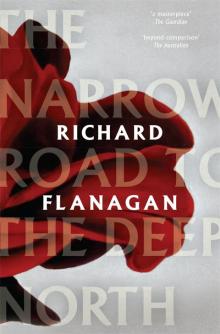 The Narrow Road to the Deep North
The Narrow Road to the Deep North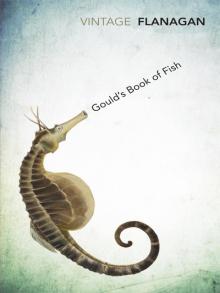 Gould's Book of Fish
Gould's Book of Fish